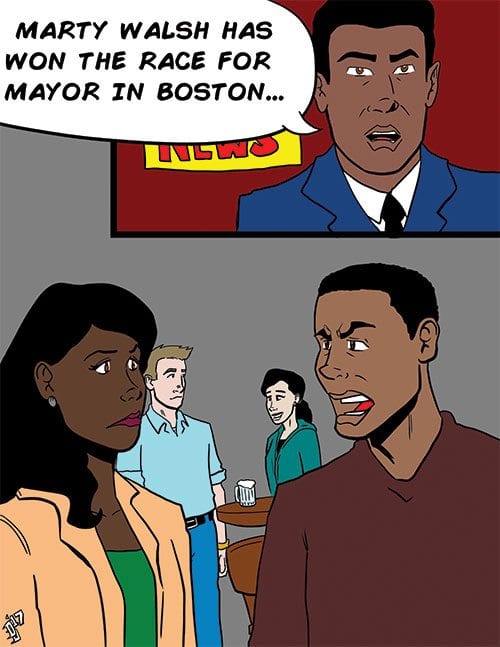
Ideally, voters support political candidates because of their character, competence and commitment to shared public policy issues. However, other considerations often have an effect on political outcomes. Since powerful interests can influence an elected politician’s decisions, groups of voters also have to consider their strategies for strengthening their own political bloc. The development of a solid voting record is considered by many blacks to be important to assure greater opportunities.
After an election is a good time to consider whether African Americans just live in ethnically compatible neighborhoods or whether they really function as a community. While there might be some difference of opinion on what candidate to support for elective office, it is generally agreed that it is important for the people to bestir themselves on Election Day and get to the polls.
In a 1942 interview, Boston’s perennial politician, James Michael Curley, who once held just about every office available, stated, “The prospects of negroes acquiring political power in Boston which they now possess, are excellent, since they have acquired a knowledge of their power and the necessity of unified action.” Clearly, this can happen only with “unified action.”
Unfortunately, some blacks think of themselves as powerless, so voting is not a top priority. As a result, the voting bloc is diminished in size when too many voters stay home on Election Day. The turnout in Boston’s recent race for mayor was only about 27.7 percent of registered voters. But that was just the average. In West Roxbury, a politically active community, the turnout was 37.5 percent, substantially higher than average.
The turnout in Ward 12, a primarily African American area, was 29.4 percent, just a little better than average, but still low enough to raise a question about whether Roxbury is really a community or just a neighborhood.
Neighborliness is a good thing, but it is not the same as the real concern for one another that exists in a community. Members of a community work together to improve circumstances for everyone. That usually requires some display of power to gain political attention. It is not necessary for everyone to support the same candidate in an election. It is quite enough for the authorities to be aware of a great political potential. Just think of what the impact would be if politicians knew that 95 percent of the residents of an area always voted.
Is there a standard for community membership? Everyone has the right not to vote, but should those who don’t exercise that right be shunned? There is a growing impatience among African Americans by those who study, work hard and live with discipline. They seem to be less willing to bear the burden of those who fail to measure up.
If there is to be political cohesion among African Americans in the future, standards of commitment to the community must be established. The alternative is everybody just going it alone.


![Banner [Virtual] Art Gallery](https://baystatebanner.com/wp-content/uploads/2024/04/Cagen-Luse_Men-at-store-e1713991226112-150x150.jpg)



